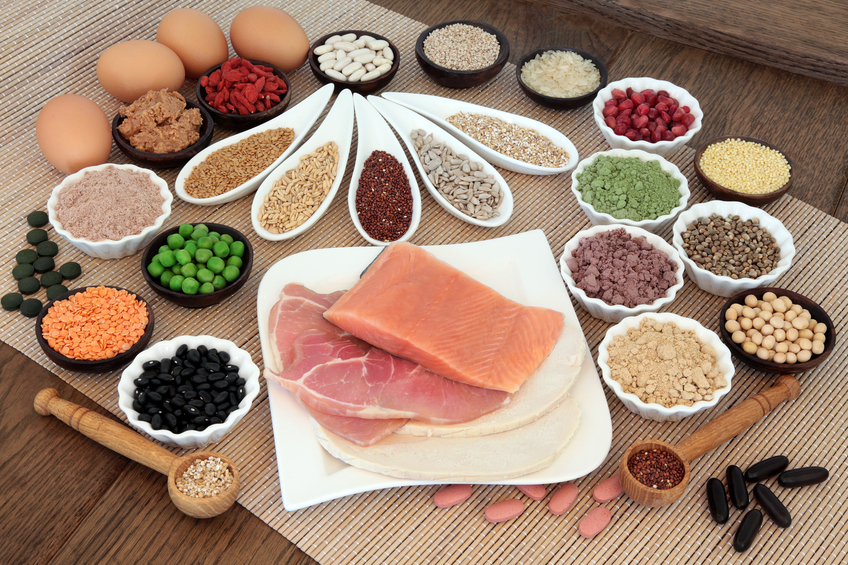I frequently see menopausal women missing a crucial nutrient in their diet, and it is dramatically affecting their:
- hormonal balance
- muscle mass
- weight
- immune system
- mental clarity
- sleep quality
- energy
- and more
This dietary secret …. is protein!
Women, especially those who are going through perimenopause and menopause, are frankly not eating enough protein.
Not enough protein in the diet is a common trigger for blood sugar imbalances, anxiety, poor immune system, depression, energy crashes, low libido, weight gain and even hot flashes.
The roller coaster of blood sugar regulation can even end up tapping out your sex hormones as well.
The decline in estrogen from menopause is linked to decreased muscle and bone strength. For this reason, women going through menopause should eat more protein.
How much protein should you eat?
The recommended amount for menopausal women is 1–2 grams of protein per kilogram of body weight.
Eat 20-30 grams of high quality, clean, organic, pasture raised/wild caught animal protein, or organic plant-based protein with every meal, every day.
It’s super important that you start every day with a high protein breakfast to avoid afternoon energy crashes, and even hot flashes.
Studies show that women in menopause, those who took 5 grams of collagen peptides daily had significantly better bone mineral density than those who took a placebo powder. It is just frankly too often a forgotten component to meals, in sufficient quantity, for women.
Interestingly, eating animal more protein was linked to an 8% lower risk of hip fracture, and eating plant protein was linked to a 12% reduction.
What else is protein important for?
We know that protein is important to keep our muscle and bones strong, balance our blood sugar, help maintain a healthy weight, keep our immune system strong, and so much more.
5 BENEFITS OF EATING MORE PROTEIN
1. Satiety
Protein is the most filling macronutrient. It reduces the hunger hormone ghrelin and boosts levels of peptide YY, a hormone that makes you feel full. This can help control appetite and reduce overall calorie intake, aiding in weight management.
2. Muscle mass
Protein is the building block of muscles. Adequate protein intake helps maintain muscle mass and promotes muscle growth, especially when combined with strength training. High protein intake also helps prevent muscle loss in a caloric deficit.
3. Reduction of cravings
Increasing protein intake can reduce cravings and the desire to snack, particularly late at night. This effect is partly due to improvements in dopamine function, a brain hormone involved in cravings and addiction.
4. Increased metabolism
Eating protein can increase your basal metabolic rate (BMR), the number of calories you burn at rest, due to the thermic effect of food (TEF) or the energy your body expends to digest and utilize nutrients like proteins. Protein has a higher TEF (20-35%) compared to fats and carbohydrates, leading to more calories burned daily.
5. Weight loss
Studies show that people who increase their protein intake tend to lose weight more effectively and maintain weight loss, mainly due to the aspects mentioned above.
Daily Protein Requirements:
If you are trying to get fit or loose weight, then increasing your protein can be helpful. Protein can make you feel fuller for longer periods of time and it can also build and maintain muscle to keep your metabolism healthy.
The best way to calculate your protein requirement is according to your body composition but if you haven’t checked that lately, then you can use this formulation.
- For non-vegetarians – 1 g / kg of body weight = # g of protein daily
- For vegetarians – 0.8 g / kg of body weight = # g of protein daily
- For athletes – 1.2 to 2 g / kg of body weight = # g of protein daily
Some people may struggle to meet their daily needs. The more common groups of people who may be lacking protein are:
- Adults over the age of 65 yrs old
- Vegans and vegetarians
- People on calorie restricted diets
Having the right amount of protein every day can help to boost up our metabolism, maintain muscle during a weight loss program, balance our blood sugar, support our adrenal glands, and in general gives us more energy.
So, at every meal, don’t forget to also grab a source of protein.
Cheers!
Dr. Helene
P.S. Whenever you are ready, let’s talk privately.
Click HERE to book your FREE 30 Minute Discovery Call with Dr. Helene & explore the next steps for you.
Related Blogs:
Best Protein Sources
Are You In Menopause? You May Be Lacking Important Nutrient
5 Tips to Lower Cortisol and Lose Stubborn Fat
Are You Tired All the Time? It Could Be Your Diet
Dr. Helene’s 5 Easy High Protein Breakfast Recipes
Sign Up HERE for Dr. Helene’s Weekly Health Tips for Wellness, Hormone Balance, Weight Loss, recipes & more!
Click HERE to read all BLOGS
HOME

